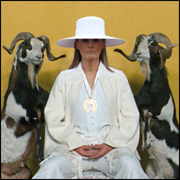|
Let us begin by setting out the basic situation. Let us assume that evolution by means of natural selection happens and is predominant. Let us assume that our minds are created by the operations of our brain. Let us also assume, for the time being, that what we can perceive through verifiable, repeatable empiricism is all that is real. So in other words, let's assume that biology is true, and that our general theory of scientific knowledge is true, and that only things that can be scientifically analyzed are real. So let's drop some of the formality and get to the basic issue. How do our beliefs interact with our behaviors? How does the mind interact with the body? There are four basic options:
So now let's consider whether we have reason to believe that our beliefs about the universe are generally true. In the first case, beliefs are invisible to evolution, which can only select for behaviors, so there is a low probability that our beliefs are true. In the second case, beliefs are selected for or against, but the truthfulness of beliefs is in their semantic content, which is not selected and so there is a low probability that our beliefs are true. In the third case, beliefs are selected against and so not only is there a low probability of their truth, but we also should probably not exist. In the fourth case, evolution can act on beliefs directly and in relation to their semantic content. But there are many possible false beliefs that may still inspire evolutionarily adaptive behaviors. For example, let's say that a prehistoric hominid, Paul, sees a tiger. He can run because he believes tigers are dangerous, which is a true, adaptive belief. But he can also run because he wants to be eaten but feels that this tiger is an unlikely prospect to do so, which is a false but adaptive belief. Or he can run because he believes tigers are dangerous though not because they will eat him, which is an adaptive belief and still a false one for our purposes, which are about our perception of the universe, though it's partially true. So while the probability that our beliefs are true is higher than in any of the other cases, it's still low. But I am saying "low probability" without really doing any math. So let's make up a simple model, where we have a model human who has 100 beliefs, any of which may be true or false, and which are randomly formed as true or false, independently of one another. What is the probability that she forms her first 50 beliefs as true ones? Remember, these are independent events! So the formula for the probability is (0.5)^50, which amounts to 8.88e-16, or 8.88e-14% chance. Remember, this is for half the beliefs, not all of them. Even forming 10 true beliefs in a row has a 0.098% chance of occurring for her. While on average half of her beliefs will be true, they will be randomly scattered throughout this set of beliefs, generally in small groups. It is possible to construct more complex methods of evaluating truthfulness of beliefs and so on, but the basic problem right here is that most of our beliefs seem to be true ones. Snakes can be poisonous or otherwise dangerous, we generally are pretty good about determining whether there's a beer in our fridge or not, and so on. Our senses tell us that our beliefs are truer than they must be by probability. So: "biology is true, and that our general theory of scientific knowledge is true, and that only things that can be scientifically analyzed are real". Pick two. Either our senses can't be trusted, or creationism is true but there is no god directing it, or, and this is frankly the most reasonable- the supernatural exists. Something, which is beyond our perceptions and knowledge, is a phenomenon which ensures that our beliefs are more likely to be true than they should be given natural selection. This is traditionally associated with Christian or more generally theistic apologetics, but it is not exclusive to them. A Buddhist would probably say that this phenomenon is Buddha-nature, and we can easily conceive of "naturalistic" ways in which this happens, which we will eventually uncover, or stranger things. Or maybe it's Freyja. That being said, this is hardly unassailable. I think that many of the ways in which it can be attacked lead to greater problems, though. For example, pragmatic models of consciousness suggest that beliefs are formed from sense-experiences solely, and leaving aside the question of how they interact with behaviors without going into creationism/believing that natural selection suspended itself at some point in our history as a species, that still creates a problem with people who have religious sense-experiences, and we still have the problem of dealing with false beliefs versus true ones from sense-experiences. Or we can accept that there is a barrier between noumenal and phenomenological reality (between what is really real, and what we can perceive), but this still accepts that the supernatural exists, it just denies that we can ever know anything about it. But please, chew on this, and think about it, and test it for weaknesses!
|
|
|
|
|

|
| # ? Apr 29, 2024 12:00 |
|
Effectronica posted:So let's drop some of the formality and get to the basic issue. How do our beliefs interact with our behaviors? How does the mind interact with the body? There are four basic options: I don't know why "Beliefs cause behavior and are evolutionarily adaptive, and are inherently true or false" is not a 5th option. In that case, our beliefs are true about as often as they should be.
|
|
|
Phyzzle posted:I don't know why "Beliefs cause behavior and are evolutionarily adaptive, and are inherently true or false" is not a 5th option. In that case, our beliefs are true about as often as they should be. That's the point of the argument- there's no known natural mechanism to determine truthfulness of beliefs, and, besides, it's also fairly unlikely because our beliefs are not all true.
|
|
|
|
|
Effectronica posted:That's the point of the argument- there's no known natural mechanism to determine truthfulness of beliefs, and, besides, it's also fairly unlikely because our beliefs are not all true. Which part, of the three, is fairly unlikely? If our beliefs are not all true, they can still cause behavior, they can still be evolutionarily adaptive, and they can still be inherently true or false. The same goes for the lack of a natural mechanism to determine truthfulness. There may be no 'natural' mechanism to determine truthfulness, yet our beliefs can still cause behavior, they can still be evolutionarily adaptive, and they can still be inherently true or false.
|
|
|
Phyzzle posted:Which part, of the three, is fairly unlikely? If our beliefs are not all true, they can still cause behavior, they can still be evolutionarily adaptive, and they can still be inherently true or false. I mean that if we have a natural-yet-unobserved mechanism that enforces truthful beliefs, it is odd that it should only operate on some beliefs and not others, at least not without creating a further, unobserved hierarchy of beliefs. I believe that parsimony suggests that this is not to be preferred. In any case, your suggestion implies telepathy in any case, because we can, given sufficient power, observe the thoughts of other people through closely examining the minds of people that know them. After all, if we can determine whether the belief "My wife loves me" is true solely through locating the truth factor on the belief structure or whatever, it is possible, then, to transfer thoughts between minds, though probably not FTL at least.
|
|
|
|
|
Let's drop the formality and get down to the basic issue: shut up, Effectronica. Evolution doesn't operate on the same timescales as culture, thread over, shut up. (USER WAS PUT ON PROBATION FOR THIS POST)
|
|
|
|
Arglebargle III posted:Let's drop the formality and get down to the basic issue: shut up, Effectronica. You're foolish if you don't believe human thought informs culture, and you're also foolish if you don't believe human thought has been informed by evolution.
|
|
|
|
Beliefs don't exist. Furthermore, I feel that the use of the name "Paul" is inappropriate for an early hominid who may or may not have had language. In actual fact you're describing Paul of Tarsus encountering the tiger of Greco-Judean nihilism, and fleeing not out of belief, but out of instinct.
|
|
|
|
Effectronica posted:I mean that if we have a natural-yet-unobserved mechanism that enforces truthful beliefs, it is odd that it should only operate on some beliefs and not others, at least not without creating a further, unobserved hierarchy of beliefs. Not odd at all. Mechanisms, natural or observed or otherwise, generally do not operate equally well in every instance. Effectronica posted:In any case, your suggestion implies telepathy in any case, because we can, given sufficient power, observe the thoughts of other people through closely examining the minds of people that know them. After all, if we can determine whether the belief "My wife loves me" is true solely through locating the truth factor on the belief structure or whatever, it is possible, then, to transfer thoughts between minds, though probably not FTL at least. No, no telepathy is needed. The thoughts of other people are not needed. No 'natural' mechanism to determine truthfulness is needed. Our beliefs can still cause behavior, they can still be evolutionarily adaptive, and they can still be inherently true or false - without any of these things.
|
|
|
|
Brannock posted:You're foolish if you don't believe human thought informs culture, and you're also foolish if you don't believe human thought has been informed by evolution. I wanted to do a more comprehensive post on this tomorrow morning when I was more likely to be clear-thinking (and could read and consider the OP more thoroughly), but a condensed version of my overall point was going to be to associate this with existentialism, at least insofar as Camus's point that we are not inherently suicidal because {The Myth of Sisphyus.txt}. It seems to clearly follow that we are not inherently suicidal because the suicidal are not like to pass on their traits and genes, or thoughts, and that same thing would affect our current thought, and, as well, our culture. Some of us may see the utter pointlessness of living, but that does not drive us to suicide, because we've either been selected against committing suicide in general, or committing suicide as a result of our thoughts and emotional state. So I think Effectronica is indeed missing a category, but not the one that Phyzzle suggests in their first post, but that of "Thoughts can be true but not necessarily influence behavior evolutionarily". edit: I've realized that this is covered by Effectronica's first category and I'm not sure what to think about it. Brannock fucked around with this message at 04:24 on Aug 16, 2015 |
|
|
|
Brannock posted:You're foolish if you don't believe human thought informs culture, and you're also foolish if you don't believe human thought has been informed by evolution. that's great, but evolution doesn't work on that timescale. you're not seeing the result of natural selection over the ~7,000 years of recorded history this is eripsa levels of badthink
|
|
|
|
Effectronica posted:... Okay...a couple of things to consider. 1) Truth value might be binary, but that does not mean that the base probability of a belief's being true or false is 50%. Your model is off. 2) Beliefs are not formed independently of one another except for maybe the first few beliefs a being has once it becomes capable of forming beliefs. Your model is off even farther. I think another option is that beliefs themselves can be cast as a type of behavior, in which case it doesn't matter what else you say about beliefs, the belief-forming machinery that tends to promote the survival of the species will propagate. It just happens that beliefs which are an accurate representation of the world and which affect our chances of survival tend to be selected for the strongest. It is entirely possible that beliefs which give inaccurate representations of the world can also ensure survival, but now you need an extra mechanism to explain how false beliefs get good results, which, as you yourself said, parsimony demands we exclude that happening. This also probably going to go down the rabbit hole of figuring out exactly what all the beliefs that make up an individual statement are really fast, so that will be fun. No it won't, it will be tedious as hell.
|
|
|
|
WhiskeyJuvenile posted:that's great, but evolution doesn't work on that timescale. Humans have had conscious thought and communication long, long before they began recording history. Are you serious?
|
|
|
|
The truth of things is immaterial. The Dao sees all things as they should properly be.
|
|
|
|
What the gently caress? No, evolution does not imply the Supernatural. To say it does is Deepak Chopra levels of autism & pseudoscience. (USER WAS PUT ON PROBATION FOR THIS POST)
|
|
|
|
Immortan posted:What the gently caress? No, evolution does not imply the Supernatural. To say it does is Deepak Chopra levels of autism & pseudoscience. Need to toss in some more spooky scientific jargon. Deep evolution shapes our collective quantum consciousnesses, from one individual into the greater omniverse we call god. - Deepak Chopra: Life on Planet vol 2.
|
|
|
|
Immortan posted:What the gently caress? No, evolution does not imply the Supernatural. To say it does is Deepak Chopra levels of autism & pseudoscience. I don't see any actual engagement with the points laid out in the OP here. You can dismiss it out of hand, but clearly this is a discussion forum and you have the free time to participate in a meaningless thread on an incredibly niche subforum on a dead comedy site in the year two thousand and fifteen, so you can probably offer it some genuine thought.
|
|
|
|
Brannock posted:Humans have had conscious thought and communication long, long before they began recording history. Are you serious? They haven't had culture, though
|
|
|
|
WhiskeyJuvenile posted:that's great, but evolution doesn't work on that timescale. While the OP is dumb, evolution can occur and does occur on very small timescales even in humans. The best example in humans is heterozygotes for sickle cell anemia being selected for in Africa due to malaria.
|
|
|
|
WhiskeyJuvenile posted:They haven't had culture, though What? Yes they absolutely did. Do you think "culture" just suddenly became a thing in 5000 BC? We've had rituals and social structures and behavioral mandates and priests and such for a really long time. Prehistorical humans weren't Sasquatches, they were actual humans with complex social structures. That's what we call culture!
|
|
|
|
Can something ever actually imply anything supernatural? Isn't supernatural things by definition implausible if not impossible, and there for you can never really rationally come to any sort of logical conclusion where supernatural phenomenon are the explanation.
|
|
|
|
Cnidaria posted:While the OP is dumb, evolution can occur and does occur on very small timescales even in humans. The best example in humans is heterozygotes for sickle cell anemia being selected for in Africa due to malaria. Another example would be the evolution of a variety of genes that contribute to alcohol processing. We can trace the evolution of those back about 10,000 years, to the development of agriculture. There's been a lot of evolution in humans that's occurred well after the migration out of Africa. Anyways, evolution really just requires a phenotype that affects reproductive success and has a heritable component. If a trait can increase or decrease the likelihood of producing successful offspring, and it can be passed down to those offspring, the heritable component can be acted upon. Evolution even applies on a group scale. You could argue that groups that carry genes which cause them to care for each others offspring are more likely to succeed, even if individuals within the group may not necessarily produce children. The heritable component is, traditionally, genetic. It's not too farfetched to argue, though, that through communication ideas themselves are a heritable element that can evolve. When children look to their parents to learn what to eat or how to respond to various events, like encountering a predator, ideas are being passed down that affect the viability of offspring. There is certainly a genetic component to this as well, the very fact that children attempt to learn from their parents is likely due to genetics. Much of our behavior, especially emotional response, is likely due to genetics and therefore affected by evolution. So basically, I'd argue that emotions, instinct, and even learned behavior affect how we respond to sense experiences, and all three of those have evolved over millions of years such that we have a better chance of surviving said sense experience. A belief as described by the OP can be either a way to interpret the sense experience and response to it after the fact, or can be knowledge that is passed down from an original experience/response to offspring to improve their chances of surviving a similar experience. There's nothing supernatural about it.
|
|
|
|
Effectronica posted:In the first case, beliefs are invisible to evolution, which can only select for behaviors, so there is a low probability that our beliefs are true. Beliefs are behaviours. Despite the way we talk about them, beliefs aren't possessions. They're not properties. To say we have a particular belief is to say we think a certain pattern, and thinking is a doing. Behaviour.
|
|
|
|
Effectronica posted:I mean that if we have a natural-yet-unobserved mechanism that enforces truthful beliefs, it is odd that it should only operate on some beliefs and not others, at least not without creating a further, unobserved hierarchy of beliefs. I believe that parsimony suggests that this is not to be preferred. Belief informs behaviour, the veracity of a belief correlates positively with the evolutionary utility of the behaviour (I believe I can eat X, I actually can eat X, therefore I will eat X and not die, more beneficial than not believing I can eat X) this forms the basis of the truth-determining mechanism. Obviously it requires correct connections to be drawn between correct observations and correct behaviours, which people may not consistently do, but it is more likely to form a correct behaviour from a correct belief than from an incorrect one, as no matter the reasoning ability, incorrect infromation is unlikely to lead to a correct conclusion. The reason we don't have 100% correct beliefs is because random chance plays a more significant part in our existence and reproductive ability than does our conscious control over our environment. Correct observation and correct reasoning/subsequent behaviour is beneficial but if you have a lovely starting point it won't help you as much as simply being born into a beneficial situation, so it is not necessary for any given individual to be good at reasoning or observing in order to propagate either physically or ideologically.
|
|
|
|
OwlFancier posted:Belief informs behaviour, the veracity of a belief correlates positively with the evolutionary utility of the behaviour (I believe I can eat X, I actually can eat X, therefore I will eat X and not die, more beneficial than not believing I can eat X) this forms the basis of the truth-determining mechanism. Obviously it requires correct connections to be drawn between correct observations and correct behaviours, which people may not consistently do, but it is more likely to form a correct behaviour from a correct belief than from an incorrect one, as no matter the reasoning ability, incorrect infromation is unlikely to lead to a correct conclusion. There's also the process of hitchhiking. If a culture has a lot of good beliefs that help them survive as well as some neutral or dumb ones, they're all probably going to be propagated together. Beliefs themselves are a way to mark people as part of a group, and figuring out who's in your group and who isn't is behavior that almost certainly has a strong biological component. In this sense, the very act of having a set of beliefs could be biological, regardless of what those beliefs actually are.
|
|
|
|
Our senses can't be trusted which is why the scientific method is important. Evolution and natural selection are not entities, they're processes. "Guided evolution" is a cop out for half-assed apologetics that want to seem less crazy. There is no direction, if a behavior or mutation allows an animal to reproduce with greater frequency than its fellows it gets a larger share of the gene pool and a greater number of offspring with beneficial traits.
|
|
|
|
Okay quick question: Is this basically just Platinga's "Evolutionary Argument" for the existence of God?
|
|
|
|
Why are you assuming there is a meaningful divide between the functions of a brain and some sort of 'mind'?
|
|
|
|
Effectronica posted:Let us begin by setting out the basic situation. Let us assume that evolution by means of natural selection happens and is predominant. Let us assume that our minds are created by the operations of our brain. Let us also assume, for the time being, that what we can perceive through verifiable, repeatable empiricism is all that is real. So in other words, let's assume that biology is true, and that our general theory of scientific knowledge is true, and that only things that can be scientifically analyzed are real. I would consider the fourth option the one that's most likely to be correct. quote:In the fourth case, evolution can act on beliefs directly and in relation to their semantic content. But there are many possible false beliefs that may still inspire evolutionarily adaptive behaviors. For example, let's say that a prehistoric hominid, Paul, sees a tiger. He can run because he believes tigers are dangerous, which is a true, adaptive belief. But he can also run because he wants to be eaten but feels that this tiger is an unlikely prospect to do so, which is a false but adaptive belief. Or he can run because he believes tigers are dangerous though not because they will eat him, which is an adaptive belief and still a false one for our purposes, which are about our perception of the universe, though it's partially true. So while the probability that our beliefs are true is higher than in any of the other cases, it's still low. How do you figure "it's still low"? Paul the caveman may have some incorrect beliefs, but if he can't figure out that tigers want to eat him he's not going to survive long. If Paul the caveman can't put two and two together that dangerous predators eat meat and a dangerous predator is chasing him to conclude that the dangerous predator wants to eat him, then Paul has considerably worse reasoning skills than a normal human being and is not going to be passing on his genes. quote:But I am saying "low probability" without really doing any math. So let's make up a simple model, where we have a model human who has 100 beliefs, any of which may be true or false, and which are randomly formed as true or false, independently of one another. What is the probability that she forms her first 50 beliefs as true ones? Remember, these are independent events! So the formula for the probability is (0.5)^50, which amounts to 8.88e-16, or 8.88e-14% chance. Remember, this is for half the beliefs, not all of them. Even forming 10 true beliefs in a row has a 0.098% chance of occurring for her. While on average half of her beliefs will be true, they will be randomly scattered throughout this set of beliefs, generally in small groups. This math is all nonsense because for one thing, not all beliefs are equally likely to be untrue, and for another, I would expect the vast majority of "beliefs" thought about in a given person's day to be true, as you yourself say in the next paragraph. quote:It is possible to construct more complex methods of evaluating truthfulness of beliefs and so on, but the basic problem right here is that most of our beliefs seem to be true ones. Snakes can be poisonous or otherwise dangerous, we generally are pretty good about determining whether there's a beer in our fridge or not, and so on. Our senses tell us that our beliefs are truer than they must be by probability. So: "biology is true, and that our general theory of scientific knowledge is true, and that only things that can be scientifically analyzed are real". Pick two. Either our senses can't be trusted, or creationism is true but there is no god directing it, or, and this is frankly the most reasonable- the supernatural exists. Something, which is beyond our perceptions and knowledge, is a phenomenon which ensures that our beliefs are more likely to be true than they should be given natural selection. No, because the argument you've made for why most beliefs shouldn't be true is bad. Logically, it's possible that Paul the caveman could think that the tiger chasing him is really a spaceship disguised as a tiger, but the odds of him thinking that versus thinking something more sane are not even. quote:That being said, this is hardly unassailable. I think that many of the ways in which it can be attacked lead to greater problems, though. For example, pragmatic models of consciousness suggest that beliefs are formed from sense-experiences solely, and leaving aside the question of how they interact with behaviors without going into creationism/believing that natural selection suspended itself at some point in our history as a species, that still creates a problem with people who have religious sense-experiences, and we still have the problem of dealing with false beliefs versus true ones from sense-experiences. Huh? Do you mind explaining what you mean by the bolded, because I have no clue. Sucrose fucked around with this message at 07:13 on Aug 16, 2015 |
|
|
|
Brannock posted:You're foolish if you don't believe human thought informs culture, and you're also foolish if you don't believe human thought has been informed by evolution. I don't think you're using those words correctly. We're not consciously aware of how our genes guide or decisions.
|
|
|
|
Effectronica posted:But please, chew on this, and think about it, and test it for weaknesses! quote:But I am saying "low probability" without really doing any math. So let's make up a simple model, where we have a model human who has 100 beliefs, any of which may be true or false, and which are randomly formed as true or false, independently of one another. What is the probability that she forms her first 50 beliefs as true ones? Remember, these are independent events! So the formula for the probability is (0.5)^50, which amounts to 8.88e-16, or 8.88e-14% chance. Remember, this is for half the beliefs, not all of them. Even forming 10 true beliefs in a row has a 0.098% chance of occurring for her. While on average half of her beliefs will be true, they will be randomly scattered throughout this set of beliefs, generally in small groups.
|
|
|
|
Effectronica, if you're going to rip off Alvin Plantinga wholesale, can you at least put more than two loving seconds of effort into concealing it? Unless you're actually him, I suppose.
|
|
|
|
You can't dodge metaphysics, the person you're copying from is dumb, and so are you.
|
|
|
|
Short answer: Effectronica posted:A whole load of bullshit that is, like, deep, maaaan (please pass me the weed) Long answer: Effectronica posted:Let us begin by setting out the basic situation. Let us assume that evolution by means of natural selection happens and is predominant. Let us assume that our minds are created by the operations of our brain. Let us also assume, for the time being, that what we can perceive through verifiable, repeatable empiricism is all that is real. So in other words, let's assume that biology is true, and that our general theory of scientific knowledge is true, and that only things that can be scientifically analyzed are real. quote:So now let's consider whether we have reason to believe that our beliefs about the universe are generally true. Apparently Paul lives in an area where it is very unusual to ever see tigers and has never talked to other people about tigers. If these things weren't true, he would have either seen a tiger eat people or heard about tigers eating people. He may also know that large animals that eat other animals can eat people, and inferred from knowledge that tigers eat other animals that they could eat him. The probability of him correctly believing that a tiger could eat him is greater than a naive "p=1/(number of things a tiger could do)". Additional case: Beliefs are inherently true or false, and can lead to adaptive behaviour. There are cases where beliefs that are true are more likely to lead to adaptive behaviour due to a higher chance of correctly evaluating and predicting your environment.(Conversely, there may be other cases where beliefs do not need to be true to be sufficiently adaptive). quote:But I am saying "low probability" without really doing any math. So let's make up a simple model, where we have a model human who has 100 beliefs, any of which may be true or false, and which are randomly formed as true or false, independently of one another. What is the probability that she forms her first 50 beliefs as true ones? Remember, these are independent events! So the formula for the probability is (0.5)^50, which amounts to 8.88e-16, or 8.88e-14% chance. Remember, this is for half the beliefs, not all of them. Even forming 10 true beliefs in a row has a 0.098% chance of occurring for her. While on average half of her beliefs will be true, they will be randomly scattered throughout this set of beliefs, generally in small groups. And here you are doing trivial maths, which does not offer additional information unless the reader is unaware of high school level probability. Protip: exercises in trivial maths are not good arguments unless you refer to a specific number later in your argument, or compare your trivial maths argument to empirical data. quote:It is possible to construct more complex methods of evaluating truthfulness of beliefs and so on, but the basic problem right here is that most of our beliefs seem to be true ones. Snakes can be poisonous or otherwise dangerous, we generally are pretty good about determining whether there's a beer in our fridge or not, and so on. Our senses tell us that our beliefs are truer than they must be by probability. So: "biology is true, and that our general theory of scientific knowledge is true, and that only things that can be scientifically analyzed are real". Pick two. Either our senses can't be trusted, or creationism is true but there is no god directing it, or, and this is frankly the most reasonable- the supernatural exists. Something, which is beyond our perceptions and knowledge, is a phenomenon which ensures that our beliefs are more likely to be true than they should be given natural selection. Snakes are often I like beer. Beer tastes best when cool. As a result, I regularly buy beer and put it in my fridge. Right now, there is probably some in my fridge. My buddy Steve also likes beer, so there is probably some in his fridge. ~My Girlfriend~ is weird and doesn't like beer, so there normally isn't beer in her fridge. The people I'm visiting are weird like my girlfriend so their fridge probably doesn't have beer in it. You have completely failed to provide any example of beliefs that do not come from observation and communication with others who have observed, and thus your argument that beliefs being true with higher probability than would be expected from something that evolved and grew up in a vacuum has no substance. quote:This is traditionally associated with Christian or more generally theistic apologetics, but it is not exclusive to them. A Buddhist would probably say that this phenomenon is Buddha-nature, and we can easily conceive of "naturalistic" ways in which this happens, which we will eventually uncover, or stranger things. Or maybe it's Freyja. quote:That being said, this is hardly unassailable. quote:I think that many of the ways in which it can be attacked lead to greater problems, though. For example, pragmatic models of consciousness suggest that beliefs are formed from sense-experiences solely, and leaving aside the question of how they interact with behaviors without going into creationism/believing that natural selection suspended itself at some point in our history as a species, that still creates a problem with people who have religious sense-experiences, and we still have the problem of dealing with false beliefs versus true ones from sense-experiences. As pointed out above, beliefs from sense experiences do not need to be true, just sufficiently true. Finding the proportion of true beliefs to be between "omniscient" and " quote:Or we can accept that there is a barrier between noumenal and phenomenological reality (between what is really real, and what we can perceive), but this still accepts that the supernatural exists, it just denies that we can ever know anything about it. quote:But please, chew on this, and think about it, and test it for weaknesses! suck my woke dick fucked around with this message at 12:31 on Aug 16, 2015 |
|
|
|
blowfish posted:Short answer: Now you put it that way what Effectonica said seems reasonable. How much did he pay you?
|
|
|
|
Regarde Aduck posted:Now you put it that way what Effectonica said seems reasonable. How much did he pay you? a year's worth of tigers and beer
|
|
|
|
What sorts of false-but-adaptive beliefs do you think we would have in the modern day if the supernatural didn't exist? We don't know how true Paul's beliefs actually were, after all, just that they were adaptive.
|
|
|
|
For the purposes of this conversation, false beliefs can be evolutionarily advantageous. Thinking that a Scarlet King Snake is an Eastern Coral Snake is a false belief, but recognizing the banded colors as poisonous snakes is probably beneficial if you ever were to come across an Eastern Coral Snake.
|
|
|
|
WhiskeyJuvenile posted:They haven't had culture, though Culture is learned and transmitted repeatable behavior across multiple generations. We've had that since the first hairy ape made an Oldowan tool and taught other hairy apes to make more tools.
|
|
|
|

|
| # ? Apr 29, 2024 12:00 |
|
I'm not totally getting this. Evolution is a powerful influence over behavior (still a poorly understood and often downplayed one) but the example given (run from lion) is an emotional reflex not a belief. There are many many ways that evolution influences our behavior at all time. Evolution primes our emotional responses, our reflexes, provides us with basic mental faculties like spacial reasoning to navigate, memory, image/sound/sensory interpretation, an ability to count, and ability to recognize other human faces and a host of other specially adapted mental modules, reflexes and responses that we often take for granted. I don't think these are beliefs and I don't think we can easily evaluate whether they're true or false.
|
|
|





















 I CANNOT EJACULATE WITHOUT SEEING NATIVE AMERICANS BRUTALISED!
I CANNOT EJACULATE WITHOUT SEEING NATIVE AMERICANS BRUTALISED!


